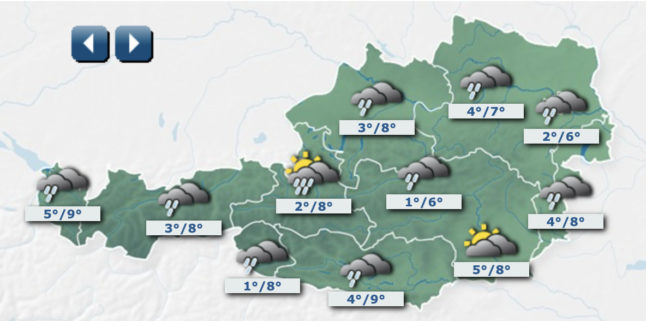Today in Austria: A roundup of the latest news on Friday

Delayed Klimabonus payments, Influenza wave coming to Austria, 2023 budget approved by National Council and more news from Austria on Friday.
- Not enough information on missed Klimabonus payments
Most people living in Austria have already received their €500 Klimabonus (an anti-inflation measure by the government) payment. However, the government estimates that around 400,000 people are still waiting for the payment - and those expecting it get very little to no information on what is happening.
Many of the people affected are EU citizens or third-country citizens, the Ministry said. However, there needs to be more transparency on who is affected by the delays and why.
"For some groups of EU citizens or third-country nationals, there are currently still some problems with the automated entitlement check by the Ministry of the Interior.", according to the Ministry of Climate.
The government added: "Every effort is being taken to find a solution, please bear with us.
You will receive your payment for 2022 in the second wave of payments starting February 2023."
READ ALSO: Klimabonus in Austria: What to do if you miss the pickup deadline for your voucher
- Have your say: What’s been your experience speaking English in Austria?
It's not uncommon for immigrants who arrive in Austria without knowing any German to rely on their English skills to get by. But how much can you use it in daily life?
- Influenza wave expected for the coming weeks
The 'flu pandemic' is coming, experts told the newspaper Der Standard. They also said there would likely be a particularly high wave after hardly any cases were registered in the past two years.
The measures against Covid-19 not only prevented infections with Sars-CoV-2 but also curbed the spread of influenza and other cold viruses.
According to the Center for Virology at MedUni Vienna, only a "slight upward trend" has been observed in influenza throughout Europe so far.
In principle, the influenza vaccination provides good protection against symptomatic infection for four months: "About 80 percent for H1 viruses, about 50 to 60 percent for H3 strains and 60 to 70 percent for B viruses," said Monika Redlberger-Fritz, a virologist from Med-Uni Vienna.
She added: "But even with vaccine breakthroughs, you are still very well protected against complications, hospitalisations and death."
READ ALSO: Colds and flu: What to do and say if you get sick in Austria
- Austria issues more than 115,000 digital driving licences
More than 115,000 people have downloaded their digital driving licences in Austria since the system was introduced last month, Die Presse reported. Police officers have scanned the licences around 4,600 times so far, according to data from the Interior Ministry.
The digital driving licence is Austria's first digital identity card.
Currently, the digital driver's licence is only recognised in Austria. However, it is based on the eIDAS Regulation of the European Union and should be recognised throughout the EU in the future.
READ ALSO: Reader question: Can I take the Austrian driving licence test in English?
- National Council approves 2023 budget
The National Council passed the budget for next year on Thursday evening, broadcaster ORF reported.
It had been debated in plenary sessions since Tuesday, with some sharp disagreements between the opposition and the government.
The overall budget for 2023 is marked by rampant inflation and high energy prices due to the Ukraine war.
READ ALSO: Austria’s 2023 budget: Where is the money going and how will it affect you?
- Weather

Screenshot from ZAMG
Apart from a few clearings, it will be mostly overcast, partly foggy at the beginning and in many places intermittent rain, least in the south, Austria's meteorologic institute ZAMG said.
The snow line is mostly between 1700m and 1100m.
In the afternoon, colder air will gradually seep into the northeast, and in the Weinviertel and parts of the Waldviertel, there will be some sleet or snowfall.
The daily high temperature is 4C to 10C in the afternoon, colder in the northeast.
If you have any questions about life in Austria, ideas for articles or news tips for The Local, please get in touch with us at [email protected].
Comments
See Also
- Not enough information on missed Klimabonus payments
Most people living in Austria have already received their €500 Klimabonus (an anti-inflation measure by the government) payment. However, the government estimates that around 400,000 people are still waiting for the payment - and those expecting it get very little to no information on what is happening.
Many of the people affected are EU citizens or third-country citizens, the Ministry said. However, there needs to be more transparency on who is affected by the delays and why.
"For some groups of EU citizens or third-country nationals, there are currently still some problems with the automated entitlement check by the Ministry of the Interior.", according to the Ministry of Climate.
The government added: "Every effort is being taken to find a solution, please bear with us.
You will receive your payment for 2022 in the second wave of payments starting February 2023."
READ ALSO: Klimabonus in Austria: What to do if you miss the pickup deadline for your voucher
- Have your say: What’s been your experience speaking English in Austria?
It's not uncommon for immigrants who arrive in Austria without knowing any German to rely on their English skills to get by. But how much can you use it in daily life?
- Influenza wave expected for the coming weeks
The 'flu pandemic' is coming, experts told the newspaper Der Standard. They also said there would likely be a particularly high wave after hardly any cases were registered in the past two years.
The measures against Covid-19 not only prevented infections with Sars-CoV-2 but also curbed the spread of influenza and other cold viruses.
According to the Center for Virology at MedUni Vienna, only a "slight upward trend" has been observed in influenza throughout Europe so far.
In principle, the influenza vaccination provides good protection against symptomatic infection for four months: "About 80 percent for H1 viruses, about 50 to 60 percent for H3 strains and 60 to 70 percent for B viruses," said Monika Redlberger-Fritz, a virologist from Med-Uni Vienna.
She added: "But even with vaccine breakthroughs, you are still very well protected against complications, hospitalisations and death."
READ ALSO: Colds and flu: What to do and say if you get sick in Austria
- Austria issues more than 115,000 digital driving licences
More than 115,000 people have downloaded their digital driving licences in Austria since the system was introduced last month, Die Presse reported. Police officers have scanned the licences around 4,600 times so far, according to data from the Interior Ministry.
The digital driving licence is Austria's first digital identity card.
Currently, the digital driver's licence is only recognised in Austria. However, it is based on the eIDAS Regulation of the European Union and should be recognised throughout the EU in the future.
READ ALSO: Reader question: Can I take the Austrian driving licence test in English?
- National Council approves 2023 budget
The National Council passed the budget for next year on Thursday evening, broadcaster ORF reported.
It had been debated in plenary sessions since Tuesday, with some sharp disagreements between the opposition and the government.
The overall budget for 2023 is marked by rampant inflation and high energy prices due to the Ukraine war.
READ ALSO: Austria’s 2023 budget: Where is the money going and how will it affect you?
- Weather

Apart from a few clearings, it will be mostly overcast, partly foggy at the beginning and in many places intermittent rain, least in the south, Austria's meteorologic institute ZAMG said.
The snow line is mostly between 1700m and 1100m.
In the afternoon, colder air will gradually seep into the northeast, and in the Weinviertel and parts of the Waldviertel, there will be some sleet or snowfall.
The daily high temperature is 4C to 10C in the afternoon, colder in the northeast.
If you have any questions about life in Austria, ideas for articles or news tips for The Local, please get in touch with us at [email protected].
Join the conversation in our comments section below. Share your own views and experience and if you have a question or suggestion for our journalists then email us at [email protected].
Please keep comments civil, constructive and on topic – and make sure to read our terms of use before getting involved.
Please log in here to leave a comment.